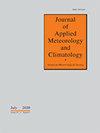大气扩散模型NAME对长程示踪剂释放实验的验证
IF 2.2
3区 地球科学
Q3 METEOROLOGY & ATMOSPHERIC SCIENCES
引用次数: 0
摘要
考虑到驾驶气象的影响和未解决运动参数化的选择,英国气象局的大气散射模型NAME(数值大气散射建模环境)根据受控示踪剂释放实验进行了验证。CAPTEX(跨阿巴拉契亚示踪剂实验)和ANATEX(穿越北美示踪剂实验)是长程分散实验,在这些实验中释放了惰性示踪剂,并在20世纪80年代测量了北美和加拿大的空气浓度。实验的NAME模拟是由ECMWF(欧洲中期天气预报中心)的再分析气象数据和WRF(天气研究和预报)模型的高级研究版本的数据驱动的。使用由四个统计参数组成的排序方法,根据实验测量结果评估NAME对空气浓度的预测。当由不同的气象源驱动时,根据该排名方法比较NAME的性能差异。还考虑了改变NAME中参数值对未解决的中尺度运动参数化的影响,特别是给出最佳性能等级的参数值是否与通常使用的值一致。将性能等级与文献中对其他粒子分散模型的分析进行了比较,这些模型包括HYSPLIT(混合单粒子拉格朗日积分轨迹)、STILT(随机时间反演拉格朗日输运)和FLEXPART(可弯曲particle)。研究发现,NAME的性能与所考虑的其他分散模型相当,不同的模型对驾驶气象的差异做出了类似的响应。本文章由计算机程序翻译,如有差异,请以英文原文为准。
Validation of the atmospheric dispersion model NAME against long-range tracer release experiments
The UK Met Office’s atmospheric dispersion model NAME (Numerical Atmospheric-dispersion Modelling Environment) is validated against controlled tracer release experiments, considering the impact of the driving meteorology and choices in the parametrization of unresolved motions. CAPTEX (Cross-Appalachian Tracer Experiment) and ANATEX (Across North America Tracer Experiment) were long-range dispersion experiments in which inert tracers were released and the air concentrations measured across North America and Canada in the 1980s. NAME simulations of the experiments have been driven by both reanalysis meteorological data from ECMWF (European Centre for Medium-Range Weather Forecasts) and data from the Advanced Research version of the WRF (Weather Research and Forecasting) Model. NAME predictions of air concentrations are assessed against the experimental measurements using a ranking method composed of four statistical parameters. Differences in the performance of NAME according to this ranking method are compared when driven by different meteorological sources. The effect of changing parameter values in NAME for the unresolved mesoscale motions parametrization is also considered, in particular, whether the parameter values giving the best performance rank are consistent with values typically used. The performance ranks are compared with analyses in the literature for other particle dispersion models, namely HYSPLIT (Hybrid Single-Particle Lagrangian Integrated Trajectory), STILT (Stochastic Time-Inverted Lagrangian Transport) and FLEXPART (FLEXible PARTicle). It is found that NAME performance is comparable to the other dispersion models considered, with the different models responding similarly to differences in driving meteorology.
求助全文
通过发布文献求助,成功后即可免费获取论文全文。
去求助
来源期刊
CiteScore
5.10
自引率
6.70%
发文量
97
审稿时长
3 months
期刊介绍:
The Journal of Applied Meteorology and Climatology (JAMC) (ISSN: 1558-8424; eISSN: 1558-8432) publishes applied research on meteorology and climatology. Examples of meteorological research include topics such as weather modification, satellite meteorology, radar meteorology, boundary layer processes, physical meteorology, air pollution meteorology (including dispersion and chemical processes), agricultural and forest meteorology, mountain meteorology, and applied meteorological numerical models. Examples of climatological research include the use of climate information in impact assessments, dynamical and statistical downscaling, seasonal climate forecast applications and verification, climate risk and vulnerability, development of climate monitoring tools, and urban and local climates.

 求助内容:
求助内容: 应助结果提醒方式:
应助结果提醒方式:


